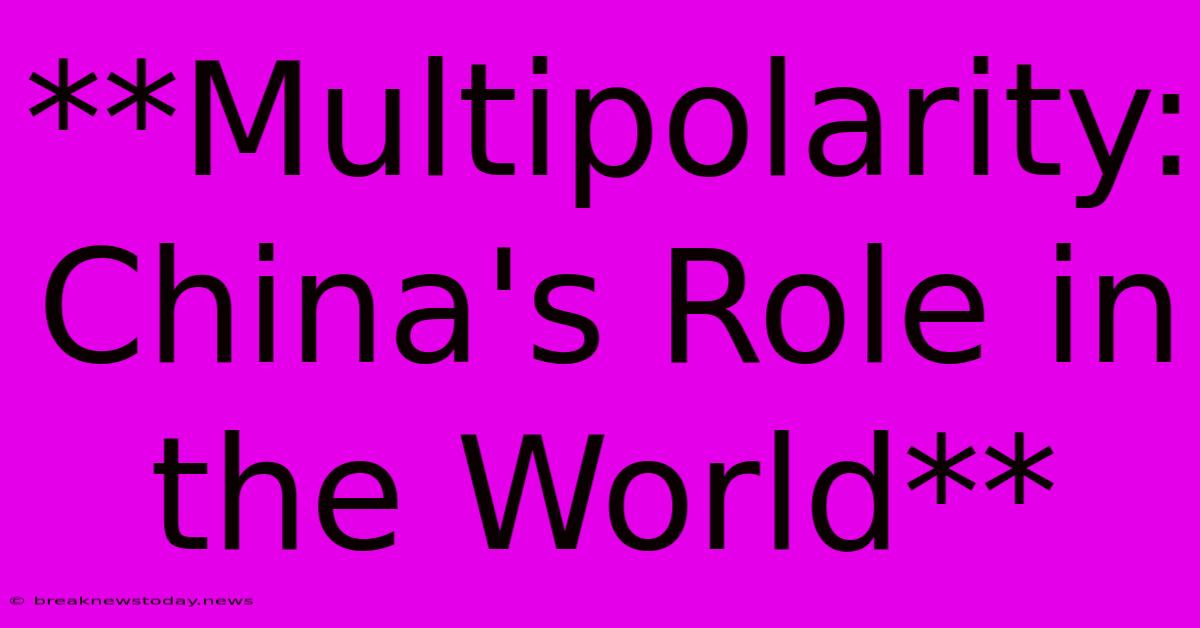**Multipolarity: China's Role In The World**

Discover more detailed and exciting information on our website. Click the link below to start your adventure: Visit Best Website naughtynakes.com. Don't miss out!
Table of Contents
Multipolarity: China's Role in the World
The world is increasingly becoming multipolar. This shift away from a unipolar world dominated by the United States is driven by the rise of new powers, particularly China. China's economic growth, technological advancements, and assertive foreign policy have reshaped the global landscape and positioned the country as a key player in the emerging multipolar order. This article delves into China's role in the world, exploring its impact on international relations, global governance, and the future of the international system.
The Rise of China: A Global Powerhouse
China's economic rise over the past few decades has been nothing short of phenomenal. From a nation grappling with poverty and economic stagnation, China has transformed into the world's second-largest economy, surpassing Japan in 2010 and becoming the largest trading nation in 2013. This economic prowess has been driven by a combination of factors:
- Market reforms: Deng Xiaoping's economic reforms in the 1970s ushered in a period of rapid economic growth fueled by free-market principles.
- Foreign investment: China actively attracted foreign investment, particularly in manufacturing, which helped boost its industrial sector.
- Infrastructure development: Massive investments in infrastructure projects, like roads, railways, and ports, facilitated trade and economic connectivity.
- Technological innovation: China has rapidly developed its technological capabilities, particularly in areas like artificial intelligence, 5G, and renewable energy.
This economic rise has made China a major player in global trade and investment, wielding considerable influence over regional and global markets.
China's Global Ambitions and Foreign Policy
China's foreign policy has shifted from a low-key approach to a more assertive stance, reflecting its growing economic and military power. Key elements of its foreign policy include:
- The Belt and Road Initiative (BRI): This ambitious infrastructure development project aims to connect China with the rest of Asia, Europe, and Africa through a network of roads, railways, ports, and pipelines. The BRI has sparked debate about China's intentions, with some viewing it as a tool to expand its influence while others see it as a win-win proposition for economic development.
- Global Governance: China actively participates in international organizations like the United Nations and the World Trade Organization, advocating for a more multipolar global governance system that reflects its interests.
- Military Modernization: China has invested heavily in modernizing its military, including the development of advanced weaponry and a growing blue-water navy. This military modernization reflects its ambition to protect its interests in the South China Sea and beyond.
- "Peaceful Rise": China has repeatedly articulated its commitment to a "peaceful rise" and has emphasized the importance of cooperation and dialogue in resolving international disputes. However, its assertive actions in the South China Sea and its growing military presence in the Indo-Pacific region have raised concerns about its intentions.
China's Role in the Multipolar World
China's rise has significantly contributed to the emergence of a multipolar world. Its influence is felt across various domains:
- Economic power: China's economic size and its growing role in global trade and investment have reshaped the global economic landscape, leading to a shift in the balance of power.
- Strategic rivalry: The US-China rivalry is the defining feature of the multipolar world. Both countries compete for global influence, economic dominance, and military superiority.
- Global governance: China's rise has challenged the existing global governance structures, leading to calls for reform and a more inclusive international order.
Challenges and Opportunities
China's growing power presents both challenges and opportunities for the international system. While its economic and technological prowess can contribute to global development and prosperity, its assertive foreign policy and its potential to challenge established norms have raised concerns among other nations.
- South China Sea disputes: China's claims to the South China Sea, a vital waterway for global shipping, have led to territorial disputes with its neighbors.
- Human rights concerns: China's human rights record, particularly its treatment of minorities like the Uyghurs, has drawn international criticism.
- Technological rivalry: China's technological advancements, especially in areas like artificial intelligence, have sparked concerns about potential threats to national security and economic competitiveness.
Navigating the challenges posed by China's rise will require cooperation, dialogue, and a shared commitment to maintaining international stability and prosperity.
Conclusion
China's role in the world is complex and multifaceted. Its economic rise and assertive foreign policy have reshaped the global landscape, ushering in a new era of multipolarity. The future of the international system will depend on how China manages its growing power and how other nations respond to its rise. By promoting cooperation and understanding, the international community can harness China's potential to contribute to a more prosperous and peaceful world.
Keywords: Multipolarity, China, Global Power, International Relations, Foreign Policy, Belt and Road Initiative, Global Governance, Military Modernization, US-China Rivalry, South China Sea, Human Rights, Technological Rivalry, Challenges, Opportunities.

Thank you for visiting our website wich cover about **Multipolarity: China's Role In The World**. We hope the information provided has been useful to you. Feel free to contact us if you have any questions or need further assistance. See you next time and dont miss to bookmark.
Featured Posts
-
Chinas Economic Growth Future Trends
Nov 02, 2024
-
Vicky Mc Clure Talks Line Of Duty Future On Late Late Show
Nov 02, 2024
-
Malignant Wiederholung Wann And Wo Im Tv
Nov 02, 2024
-
Ysl Trial Verdict Lessons Learned
Nov 02, 2024
-
Islanders Vs Sabres Game Preview Watch Info
Nov 02, 2024
